 MyDogBreeds
MyDogBreeds Whippet is originated from United Kingdom but Italian Greyhound is originated from Italy. Whippet may grow 18 cm / 8 inches higher than Italian Greyhound. Whippet may weigh 6 kg / 14 pounds more than Italian Greyhound. Both Whippet and Italian Greyhound has almost same life span. Whippet may have more litter size than Italian Greyhound. Both Whippet and Italian Greyhound requires Low maintenance.
Whippet is originated from United Kingdom but Italian Greyhound is originated from Italy. Whippet may grow 18 cm / 8 inches higher than Italian Greyhound. Whippet may weigh 6 kg / 14 pounds more than Italian Greyhound. Both Whippet and Italian Greyhound has almost same life span. Whippet may have more litter size than Italian Greyhound. Both Whippet and Italian Greyhound requires Low maintenance.
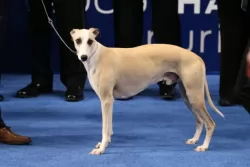 You can just see that Whippets are designed for speed with those super lean, slender bodies. They were developed by crossing Greyhounds with smaller terriers.
You can just see that Whippets are designed for speed with those super lean, slender bodies. They were developed by crossing Greyhounds with smaller terriers.
In open areas, they can pick up a high speed. In the 19th century in certain parts of England, they were used in races. They actually originated in England.
The Whippet is an ancient dog breed if you can go according to artwork which dates back to ancient Egyptian times.
They were also known as Snap dogs or small Greyhounds. You can say that the modern Whippet emerged in 1891. This was when the Kennel Club gave the breed official recognition. It was in 1888 that the dog was recognized by the American Kennel Club.
 The Italian Greyhound is an ancient breed, a purebred originating in Italy but with evidence to suggest it was also to be found in Turkey and Greece.
The Italian Greyhound is an ancient breed, a purebred originating in Italy but with evidence to suggest it was also to be found in Turkey and Greece.
It's a small breed dog that became popular with Italian royalty in the 16th century. Over the centuries, the dog's appearance has remain unchanged, although breeders tried to make it even smaller, leading to problems with the health of the dog.
Towards the end of the 1800s, it was fortunate that breed fanciers implemented breeding programs to restore the dog's look's and strength. The American Kennel Club registered the Italian Greyhound in 1886. Today the dog is a wonderful companion dog.
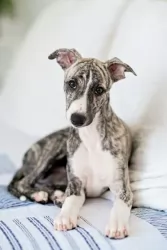 The Whippet is a medium-sized sighthound breed standing at between 45–56cm in height and weighing anything between 6 and 13kg.
The Whippet is a medium-sized sighthound breed standing at between 45–56cm in height and weighing anything between 6 and 13kg.
They descended from Greyhounds, resembling them in looks, just smaller. They are part of the Hound group, It’s a deep-chested dog with a long, lean head with fairy large eyes, a long neck, floppy ears and slim legs. The tail is long and slender. The coat is short and smooth and comes in many colors – tan, silver, black white, brindle and bi- or tri-colored.
The Whippet loves to run but when they’re not prancing around, they love spending time with their human family and that includes other pets as well as children.
They’re demonstrative and love showing their love for their family. They’re able to adapt to life in the city or the countryside but they will need exercising.
This is also a dog that rarely barks. They’re willful dogs so will do well with training and socialization. In fact, without proper socialization, they can become timid in unknown environments. They're intelligent so wont have problems with learning.
If you’re looking for a good watchdog and protector, you won’t find these characteristics in the Whippet.
 The sweet Italian Greyhound is much like the regular Greyhound, just smaller but every bit as sleek, elegant and fine-boned. He stands at between 33 and 38cm at the withers and weighs just 3 to 7kg. He is slender and elegant.
The sweet Italian Greyhound is much like the regular Greyhound, just smaller but every bit as sleek, elegant and fine-boned. He stands at between 33 and 38cm at the withers and weighs just 3 to 7kg. He is slender and elegant.
He has long, fine-boned legs and his short, smooth coat makes him easy to groom too. The coat comes in a number of colors such as fawn, tan, grey, reddish, chocolate and black.
Described as sweet, intelligent and playful, the Italian Greyhound adapts easily to life in the city or to country life.
He is easy to train too, and even though he is small and amicable, it is still a good idea to have him trained and socialized as he is just a simple pleasure to have around then. He just loves the company of his human family and becomes a gentle friend to other dogs, to children in the home and to the elderly.
He is a frail toy dog, and he needs to be constantly watched over that he isn’t handled roughly by disrespectful children or from bigger pets. He is an active breed and will love to be played with and join you on your walks. Even though he is such a frail, fragile looking dog, he has a feisty, stubborn, defiant side to him and that is why training and socialization becomes important. He will be reserved around strangers.
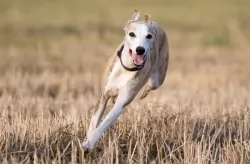 When you bring a sweet-natured Whippet into your life and home you’ll discover that apart from reveling in having a good run, their next favorite thing is to be resting quietly wherever their human companions are.
When you bring a sweet-natured Whippet into your life and home you’ll discover that apart from reveling in having a good run, their next favorite thing is to be resting quietly wherever their human companions are.
They’re docile dogs, loving to snuggle up to you, and not enjoying the cold. These quiet, gentle dogs are totally non- aggressive, just wanting to be with you, making you a splendid companion and pet.
 If you’re looking for a sweet, gentle canine friend, the Italian Greyhound promises to be just that. They just crave human companionship and are eager to please.
If you’re looking for a sweet, gentle canine friend, the Italian Greyhound promises to be just that. They just crave human companionship and are eager to please.
He isn’t the ideal playmate for children, simply because he is frail and can get hurt easily in rough play.
Small he may be, but he is intelligent and alert, and he will bark to warn you of strangers. They are essentially indoor dogs, and when you bring one of them into your home, you’ll be rewarded with a devoted, loving and loyal canine friend.
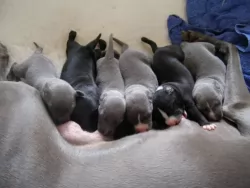 The lean Whippet doesn’t have any particular health problems but it is always a good idea to be clued up on some of the more common dog diseases there are.
The lean Whippet doesn’t have any particular health problems but it is always a good idea to be clued up on some of the more common dog diseases there are.
Buying a Whippet puppy from a responsible breeder will help with ensuring a healthier dog as dogs like these have had a good start and will have been vaccinated and dewormed.
This is when the heart of the dog beats too fast or too slow or it may even skip a beat. It is fairly common in dogs and it could indicate a more serious underlying condition.
An irregular heartbeat can bring about physical weakness and even loss of consciousness. Your veterinarian will want to examine your dog and listen to the history of symptoms and events that could have led to the condition. Your vet will then discuss treatment.
 Your small Italian Greyhound isn’t a sickly dog breed, and in fact, with the right care, he can live to be between 10 to 14 years of age.
Your small Italian Greyhound isn’t a sickly dog breed, and in fact, with the right care, he can live to be between 10 to 14 years of age.
As with any dog breed however, there will be some more common conditions to watch for in the Italian Greyhound. Some of these are epilepsy, hyperthyroidism and periodontal disease.
There are different types and causes of seizures, and there are actually no definitive tests for epilepsy. One seizure isn’t enough to make a diagnosis and more than one seizure is usually recorded before a diagnosis can be made and treatment prescribed.
These treatments don’t cure Epilepsy but rather control the symptoms and keep the dog seizure-free so that they can have a normal life.
Seizures are not all the same – some are life-threatening and advice from the internet can’t be looked upon as adequate. With a dangerous disease such as epilepsy, excellent and qualified veterinary help will be required.
Gum disease can be terrible for your pet. Apart from bone loss and loss of teeth, your pet will experience pain. Periodontal disease may well be common in dogs, but it can be prevented.
Once an animal has eaten food, particles of food, saliva and bacteria form plaque over the teeth and this doesn’t only cause damage to the teeth but to the entire immune system.
This disease can cause inflamed gums and loss of teeth. It is important to brush your pet’s teeth with special canine toothbrush and toothpaste.
The truth is, periodontal disease can cause more problems than just tooth pain which is bad enough. Dogs with gum inflammation may be at higher risk for heart- and kidney disease too. If you’re worried about your dog, take him in to your vet for an oral examination and teeth cleaning.
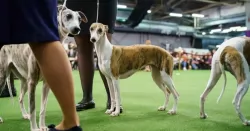 Whippets love running so if you’re lucky to live on a farm or at the beach, he will love those short bursts of speed in open places, chasing a ball. You can take him for a walk every day too.
Whippets love running so if you’re lucky to live on a farm or at the beach, he will love those short bursts of speed in open places, chasing a ball. You can take him for a walk every day too.
Whippets are looked upon as low maintenance dogs that don't shed much. A good brush twice a week will be adequate for this slender dog. The skin is vulnerable to cuts so check him over when you’re brushing him and make sure he hasn’t any sores or scrapes on the skin.
How much your adult dog eats depends on his size and his activity levels. Dogs are individuals and not all Whippets will eat the same amount of food. Puppies require 4 bowls of food a day while the adult Whippet will want 2 bowls of food.
There are excellent dry kibble dog foods on the market but your Whippet will also like some home-made food like chicken and vegetables. The quality of dog food you provide for your Whippet will make a huge difference to his health.
 The Italian Greyhound has a short, smooth, satin-type coat which is easy to maintain. Gently brush him once or twice a week, being careful not to press down hard as he has frail, bambi-like legs.
The Italian Greyhound has a short, smooth, satin-type coat which is easy to maintain. Gently brush him once or twice a week, being careful not to press down hard as he has frail, bambi-like legs.
He also sheds little, making him a low maintenance breed. Because of the short coat, take particular care of him in the Winter and don’t allow him to become overly cold.
Your Italian Greyhound will require a diet rich in nutritional value, and if your particular dog is quite active you will need to feed him about 450 calories a day and sometimes more.
Each dog is an individual and will have different dietary needs. If you feed your pet a top quality commercially manufactured food, read the packaging for guidance on food portion sizes.
Speak to your vet if you are unsure how to feed your dog so that his food and the amounts you feed him contribute to his good health. He must always have access to fresh, cool water.